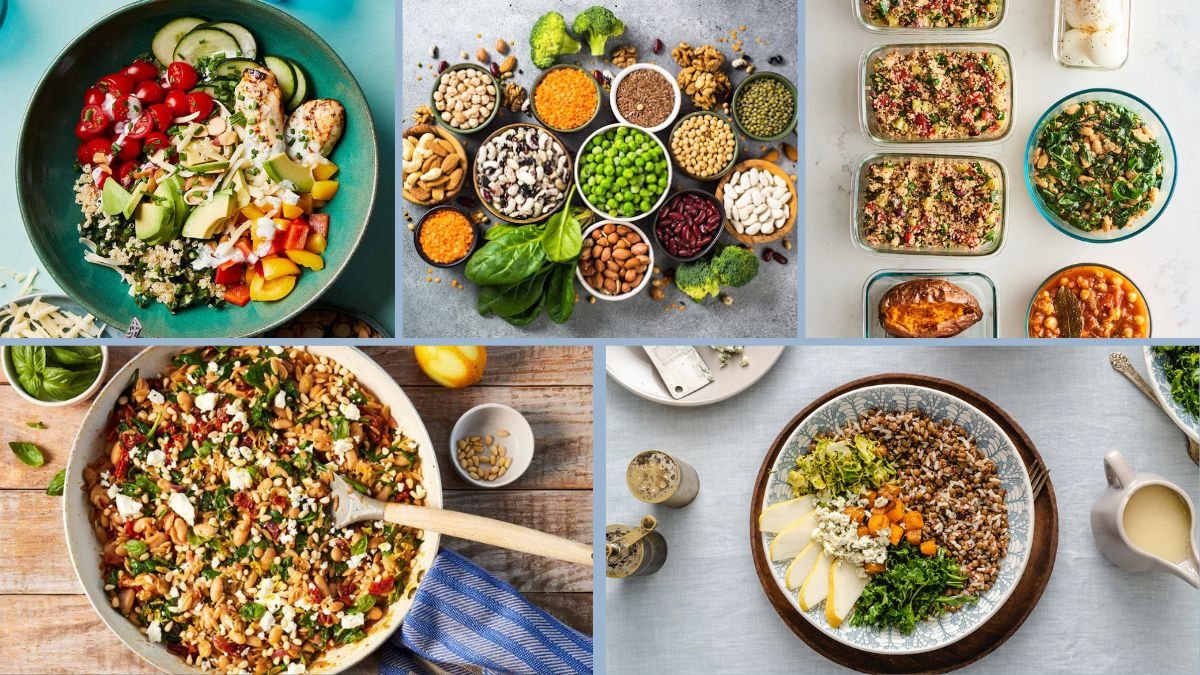Managing blood sugar while eating well doesn’t have to be boring or restrictive. The Mediterranean diet — rich in whole plant foods, healthy fats, and fiber — is a great choice for people with diabetes or prediabetes. This 7-day vegetarian meal plan focuses on steady energy, blood sugar balance, and of course, delicious food.
Each day includes high-fiber ingredients like legumes, whole grains, veggies, and nuts — paired with healthy fats and plant-based proteins — to help prevent blood sugar spikes, support insulin sensitivity, and keep you full for longer. Plus, the meals are packed with Mediterranean flavors that make eating healthy feel like a treat.
Meal Plan at a Glance
| Time | Examples |
|---|---|
| Breakfast | Greek yogurt bowls, chia pudding, veggie toast |
| A.M. Snack | Fruit & nuts, yogurt, hard-boiled eggs |
| Lunch | Chickpea salads, veggie wraps, lentil soups |
| P.M. Snack | Hummus & veggies, trail mix, edamame |
| Dinner | Stuffed peppers, zucchini pasta, bean stews |
7-Day Vegetarian Diabetes-Friendly Mediterranean Meal Plan
Day 1 – Lentil Power
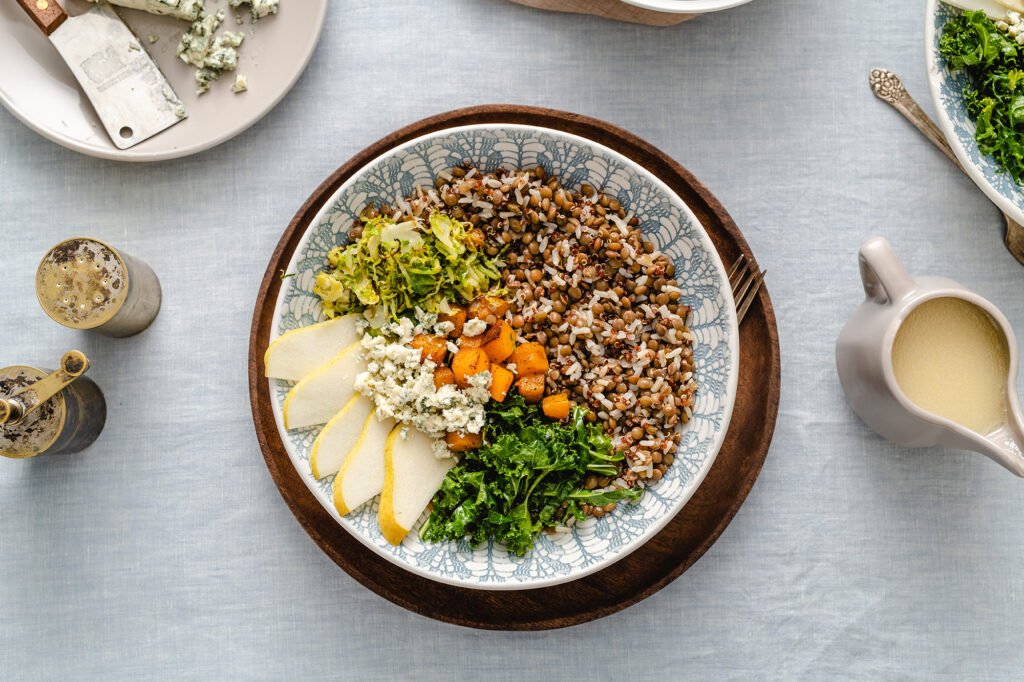
Breakfast (320 Calories)
Greek Yogurt with Chia Seeds, Cinnamon & Fresh Strawberries
Morning Snack (180 Calories)
10 almonds + 1 small pear
Lunch (465 Calories)
Mediterranean Lentil Salad with Cucumbers, Tomatoes, Olives, Red Onion & Lemon-Olive Oil Dressing
1 slice whole grain toast
Afternoon Snack (220 Calories)
Carrot sticks + 3 tbsp hummus
Dinner (490 Calories)
Zucchini Stuffed with Quinoa, Mushrooms & Spinach
Mixed greens with olive oil & vinegar
Daily Total: 1,675 calories, 38g fiber, 64g protein
To make it 1,500: Remove toast at lunch
To make it 2,000: Add 1 tbsp olive oil to dinner + ¼ avocado at lunch
Day 2 – Balanced & Bright
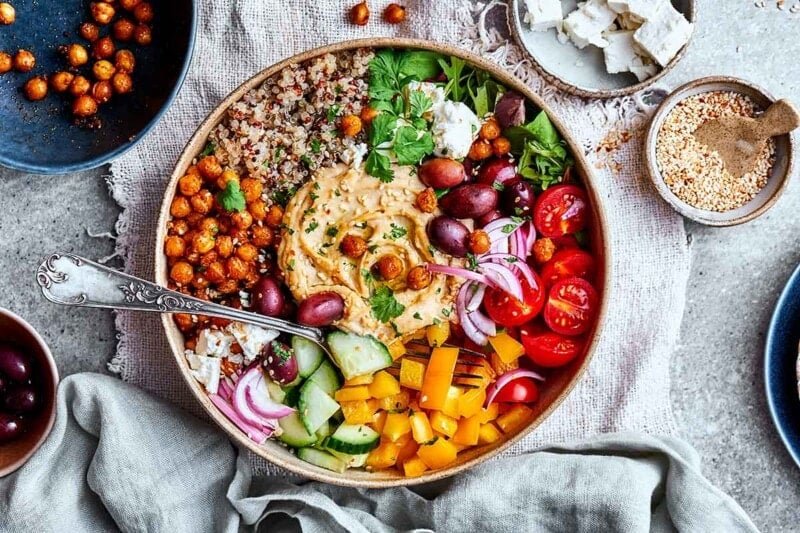
Breakfast (330 Calories)
3-Ingredient Chia-Berry Pudding with Almond Milk & Ground Flax
Morning Snack (200 Calories)
Greek yogurt + 5 walnuts
Lunch (470 Calories)
Chickpea Veggie Wrap in Whole-Wheat Tortilla with Lettuce, Carrot, Tomato & Tahini
Afternoon Snack (210 Calories)
Sliced bell peppers with 3 tbsp hummus
Dinner (520 Calories)
Eggplant & White Bean Ratatouille with Side of Farro
Arugula Salad with Lemon Dressing
Daily Total: 1,730 calories, 36g fiber, 68g protein
1,500: Skip walnuts from snack
2,000: Add 1 hard-boiled egg to breakfast + 1 tbsp olive oil to salad
Day 3 – Blood Sugar Stability
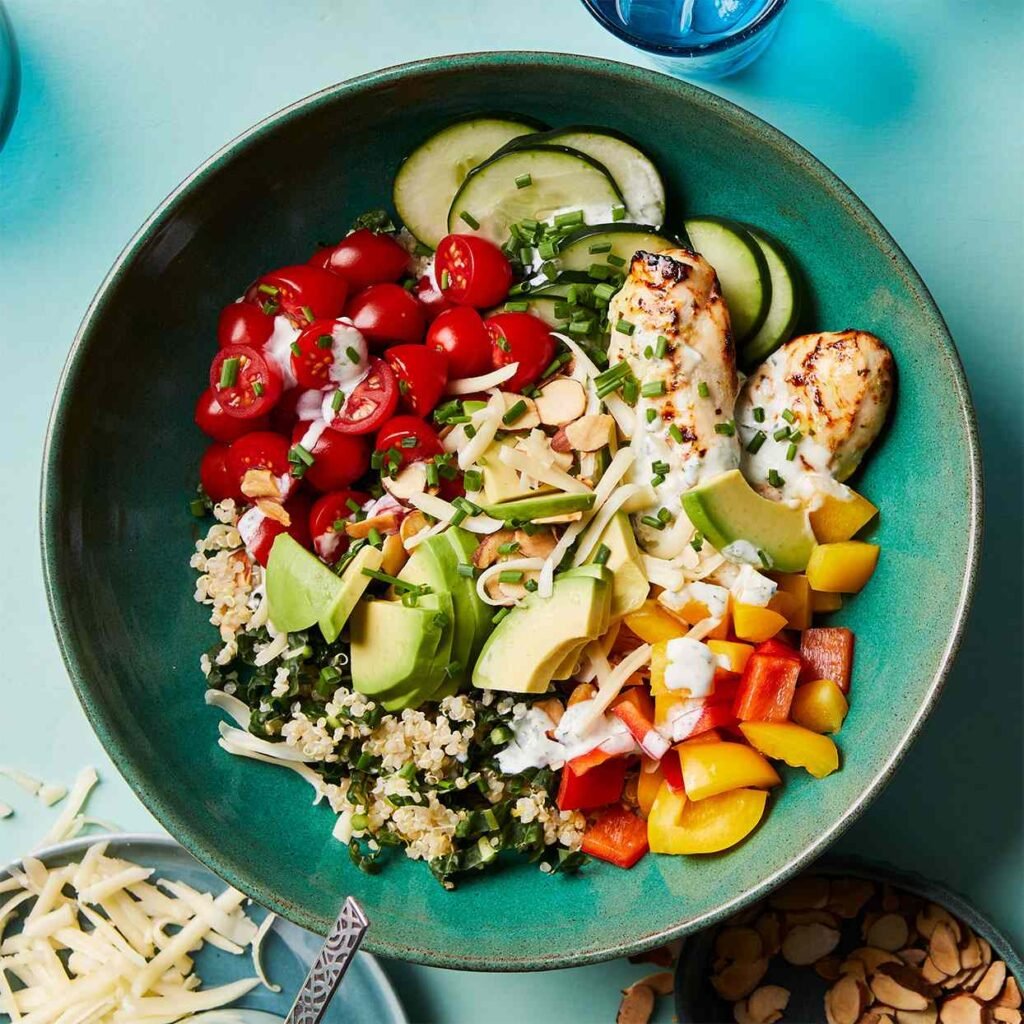
Breakfast (315 Calories)
Oats Cooked in Almond Milk + Chopped Walnuts + Blueberries
Morning Snack (215 Calories)
Hard-boiled egg + ½ avocado
Lunch (485 Calories)
Roasted Veggie Quinoa Bowl with Roasted Chickpeas and Tahini Drizzle
Afternoon Snack (200 Calories)
1 Energy Ball + 1 clementine
Dinner (525 Calories)
Stuffed Bell Peppers with Lentils, Brown Rice & Herbs
Steamed Broccoli
Daily Total: 1,740 calories, 39g fiber, 71g protein
1,500: Skip energy ball
2,000: Add 1 slice whole grain bread with almond butter at breakfast
Day 4 – Fiber-Rich & Filling
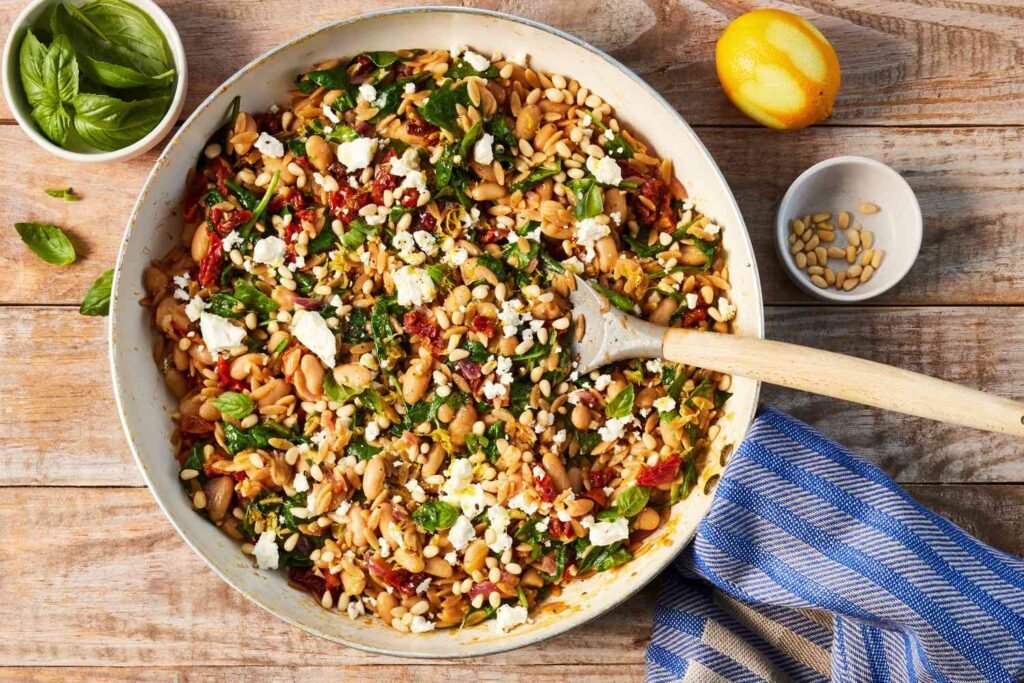
Breakfast (310 Calories)
Whole-Grain Toast with Avocado + Cherry Tomatoes + Hemp Seeds
Morning Snack (190 Calories)
Plain Greek yogurt + ½ cup raspberries
Lunch (470 Calories)
Warm Barley Salad with White Beans, Red Pepper, and Fresh Basil
Afternoon Snack (220 Calories)
Trail mix (¼ cup seeds & nuts)
Dinner (515 Calories)
Chickpea & Kale Stew with Garlic and Tomatoes
1 small side salad with balsamic vinaigrette
Daily Total: 1,705 calories, 37g fiber, 66g protein
1,500: Use 2 tsp oil instead of 1 tbsp in dinner
2,000: Add 1 boiled egg + 1 ounce feta to lunch
Day 5 – Plant-Protein Packed
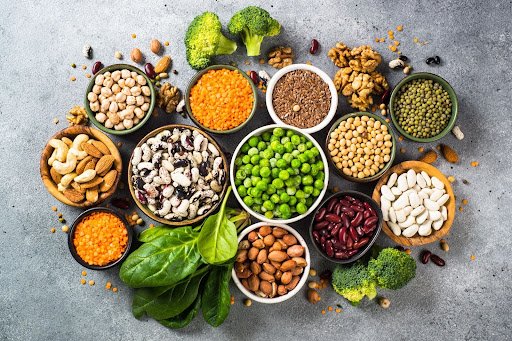
Breakfast (335 Calories)
Chia-Strawberry Yogurt Bowl with Pumpkin Seeds
Morning Snack (200 Calories)
Apple + 1 tbsp almond butter
Lunch (475 Calories)
Lentil-Tomato Soup with Oregano & Olive Oil
Whole Grain Roll
Afternoon Snack (190 Calories)
Roasted Edamame + Cucumber Slices
Dinner (510 Calories)
Whole Wheat Pasta with Roasted Vegetables + Walnut Pesto
Daily Total: 1,710 calories, 41g fiber, 72g protein
1,500: Remove roll from lunch
2,000: Add 1 tbsp olive oil to dinner + 1 square dark chocolate to snack
Day 6 – Green & Glorious
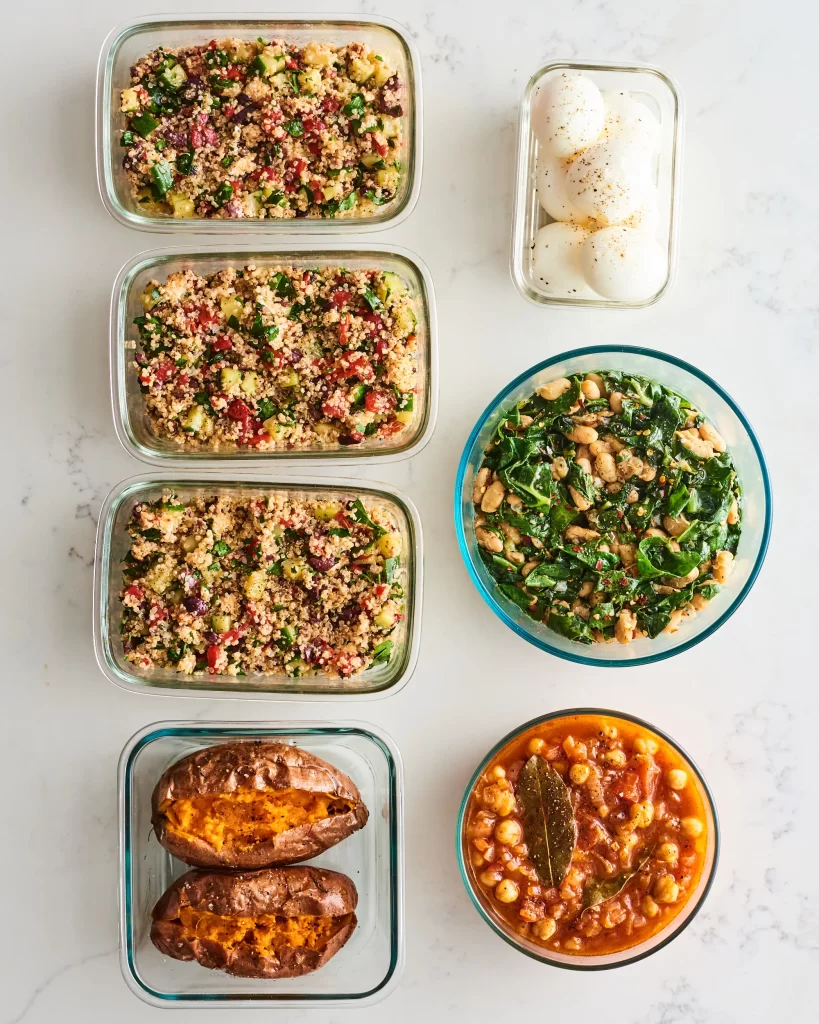
Breakfast (320 Calories)
Green Smoothie with Spinach, Almond Milk, Banana, and Chia
Morning Snack (195 Calories)
Greek yogurt with sunflower seeds
Lunch (480 Calories)
Falafel Bowl with Brown Rice, Tahini Sauce, Lettuce, Tomato, and Cucumber
Afternoon Snack (215 Calories)
Sliced zucchini + Hummus + Olives
Dinner (525 Calories)
Eggplant Caponata with Chickpeas
Side of whole grain polenta
Daily Total: 1,735 calories, 38g fiber, 69g protein
1,500: Skip seeds from A.M. snack
2,000: Add 1 boiled egg and 1 tbsp olive oil at lunch
Day 7 – Sunday Comfort
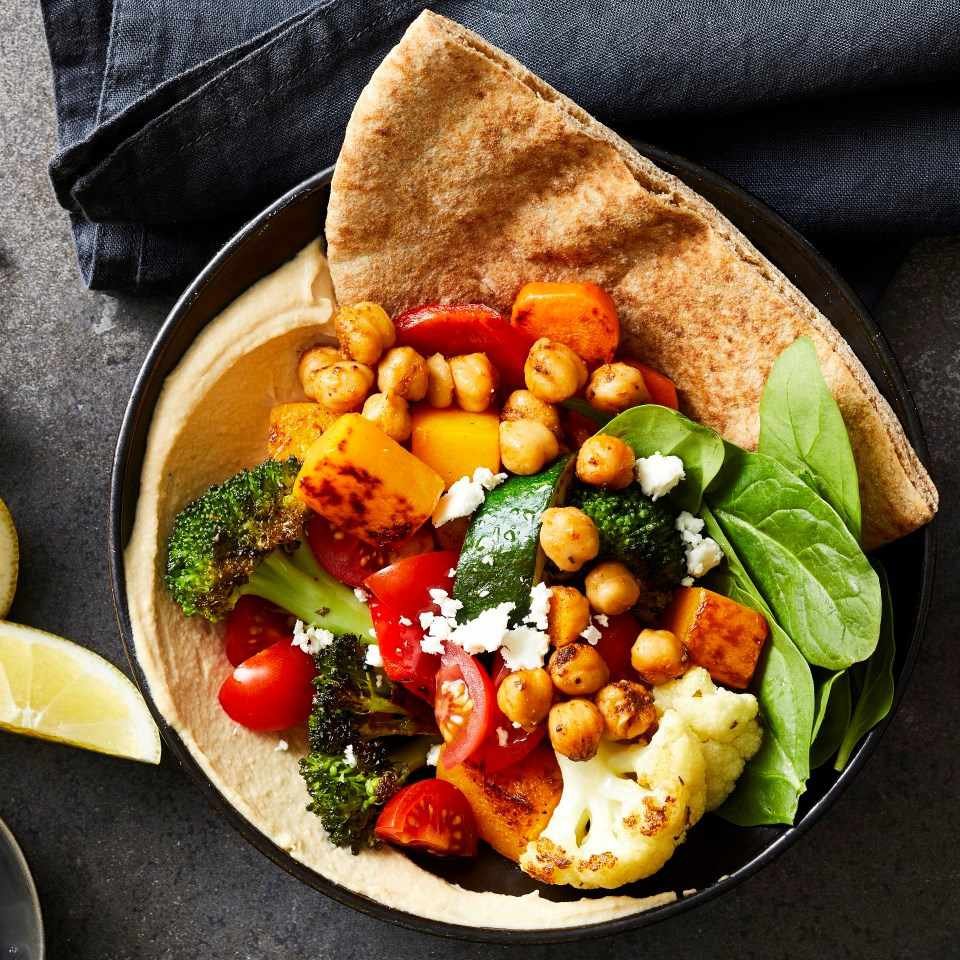
Breakfast (340 Calories)
“Egg in a Hole” with Bell Peppers + Avocado Salsa (Tofu-based or Veggie Scramble Alternative)
1 small orange
Morning Snack (200 Calories)
Energy Ball + 5 almonds
Lunch (510 Calories)
Sweet Potato & Chickpea Bowl with Spiced Yogurt Sauce
Greens on the side
Afternoon Snack (210 Calories)
Greek yogurt + ½ banana
Dinner (510 Calories)
Zucchini Noodles with Tomato Sauce & Lentil “Meatballs”
Side salad with sunflower seeds
Daily Total: 1,770 calories, 42g fiber, 71g protein
1,500: Skip almonds from snack
2,000: Add 1 tbsp olive oil and ¼ avocado to lunch
Prep Ahead Tips
- Make chia pudding for breakfast for Days 2, 3, and 5
- Cook lentils or chickpeas in bulk to use in salads and stews
- Prepare energy balls and hummus for snacks all week
- Chop veggies and store in airtight containers for quick meal assembly
Frequently Asked Questions
Can I swap meals around?
Yes! As long as you keep your carb intake balanced and include protein, healthy fats, and fiber, you can mix meals across days.
Can I eat the same breakfast every day?
Absolutely. Just ensure it includes fiber and a protein/fat source to keep blood sugar stable.
Why no 1,200-calorie version?
1,200 calories is often too low to meet daily nutritional needs, especially for those with diabetes who benefit from steady energy intake.
What makes this plan diabetes-friendly?
Each meal is balanced with complex carbs, fiber, and healthy fat to prevent glucose spikes, improve insulin sensitivity, and keep you full.
Tips for Blood Sugar & Heart Health
- Pair carbs with fiber and fat: Slows digestion, avoids spikes
- Stay hydrated: Water helps flush excess glucose
- Get moving daily: Walking after meals improves glucose use
- Sleep well: Poor sleep raises insulin resistance
- Avoid ultra-processed carbs: Stick to whole, real food
